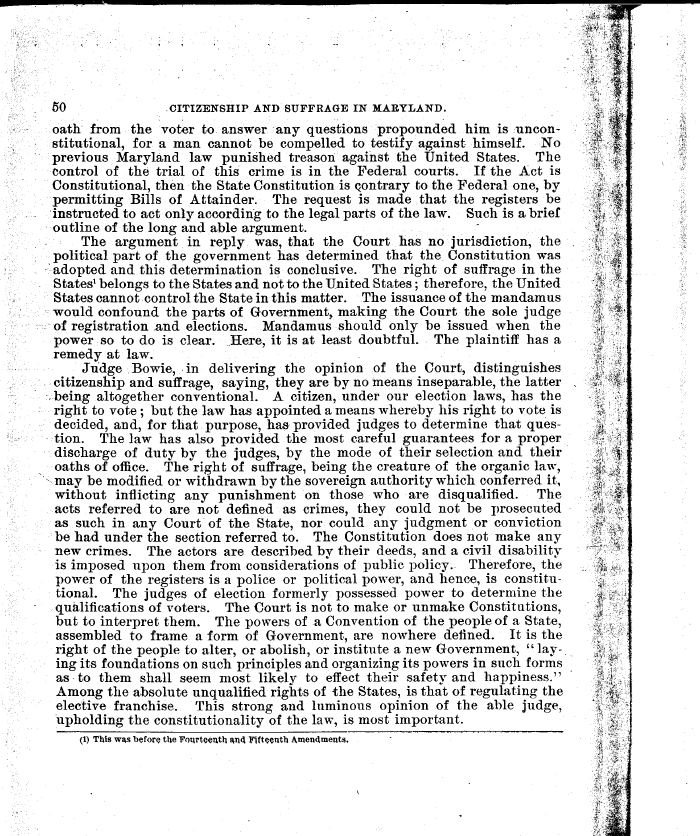|
50 CITIZENSHIP AND SUFFRAGE IN MARYLAND.
oath from the voter to answer any questions propounded him is uncon-
stitutional, for a man cannot be compelled to testify against himself. No
previous Maryland law punished treason against the United States. The
control of the trial of this crime is in the Federal courts. If the Act is
Constitutional, then the State Constitution is contrary to the Federal one,
by
permitting Bills of Attainder. The request is made that the registers be
instructed to act only according to the legal parts of the law. Such is a
brief
outline of the long and able argument. -
The argument in reply was, that the Court has no jurisdiction, the
political part of the government has determined that the Constitution was
adopted and this determination is conclusive. The right of suffrage in the
States' belongs to the States and not to the United States; therefore, the
United
States cannot control the State in this matter. The issuance of the mandamus
v would confound the parts of Government, making the Court the sole judge
of registration .and elections. Mandamus should only be issued when the
power so to do is clear. _Here, it is at least doubtful. The plaintiff has a
remedy at law.
Judge . Bowie, . in delivering the opinion of the Court, distinguishes
citizenship and suffrage, saying, they are by no means inseparable, the
latter
being altogether conventional. A citizen, under our election laws, has the
right to vote; but the law has appointed a means whereby his right to vote.
is
decided, and, for that purpose, has provided judges to determine that qus-
tion. The law has also provided the most careful guarantees for a proper
discharge of duty by the judges, by the mode of their selection and their
oaths of office. The right of suffrage, being the creature of the organic
law,
may be modified or withdrawn by the sovereign authority which conferred it,
without inflicting any punishment on those who are disqualified. The
acts referred to are not defined as crimes, they could not be prosecuted
as such in any Court of the State, nor could any judgment or conviction
be had under the section referred to. The Constitution does not make any
new crimes. The actors are described by their deeds, and a civil disability
is imposed upon them from considerations of public policy. Therefore, the
power of the registers is a police or political power, and hence, is
constitu-
tional. The judges of election formerly possessed power to determine the
qualifications of voters. The Court is not to make or unmake Constitutions,
but to interpret them. The powers of a Convention of the people of a State,
assembled to frame a form of Government, are nowhere defined. It is the
right of the people to alter, or abolish, or institute a new Government, "
lay-
ing its foundations on such principles and organizing its powers in such
forms
as - to them shall seem most likely to effect their safety and happiness."
Among the absolute unqualified rights of the States, is that of regulating
the
elective franchise. This strong and luminous opinion of the able judge,
upholding the constitutionality of the law, is most important.
(i) This was before the Fourteenth and Fifteenth Amendments. -
|

